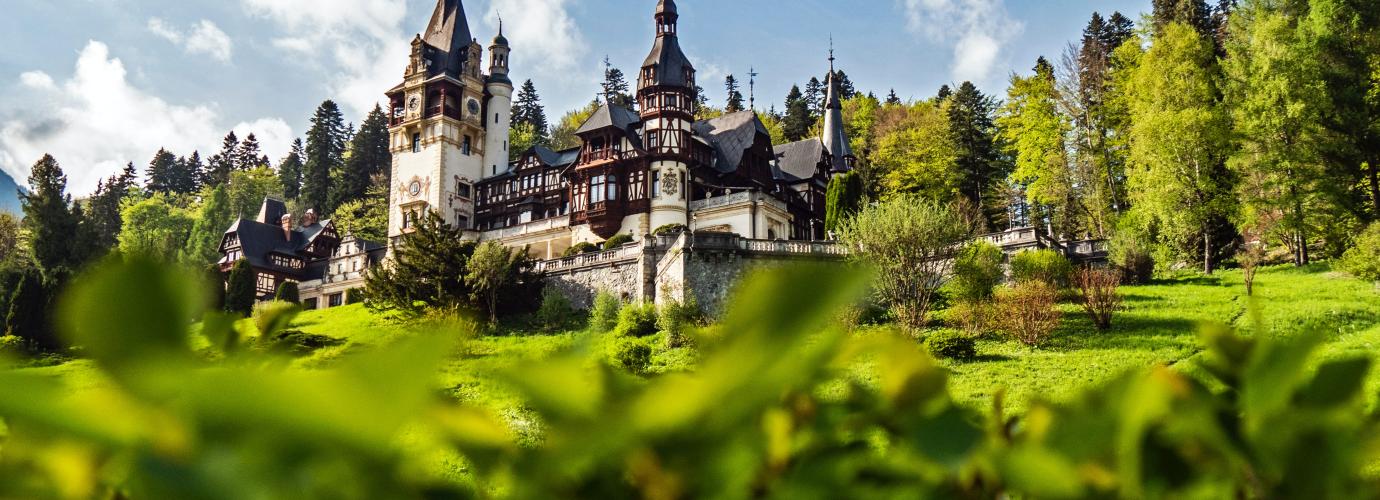The name Romania was adopted in 1862, after the establishment of the nation-state through the unification of the two Romanian Principalities, Wallachia and Moldova, in 1859.
General data:
-
Form of government: republic.
-
Location: in the Northern Hemisphere at the intersection of the parallel 45° north latitude with the meridian 25° east longitude, and in the central south-eastern part of Europe, on the lower course of the Danube River, at about equal distances from the extremities of the European continent. It has a coast on the Black Sea.
-
Neighbours: Hungary to the west, Serbia to the south-west, Ukraine to the north and east, the Republic of Moldova to the north-east and east, and Bulgaria to the south.
-
Area: 238 391 km2, the 83rd largest country in the world and the 9th in Europe, plus an area of 23 700 km² of the Black Sea platform.
-
Official language: Romanian, which belongs to the group of eastern Romance languages and is related to Italian, French, Spanish, Portuguese, Catalan and further on to most European languages.
-
Population: 22 089 000 (source: National Institute of Statistics, 2021), the 7th most populated in Europe.
-
Nationalities: Romanian 88.9 %, Hungarian (including the Székelys (secui in Romanian)) 6.5 %, Roma (ţigani in Romanian) 3.3 %, others 1.3 % (according to the census of October 2011).
-
Religion: Christian Orthodox 86.45 %, Romano-Catholic 4.62 %, Reformed 3.19 %, Pentecostal 1.92 %, others 3.82 % (according to the census of October 2011).
-
Capital: Bucharest (since 1862).
-
Current geopolitical position: a member of NATO since 2004 and a member of the EU since 2007.
Romania is a member of several international organisations, such as the United Nations since 1955, Council of Europe since 1993, the European Union since 1 January 2007, NATO since 29 March 2004, OSCE, OIF since 2003, the Latin Union since 1980, and a member of several economic institutions like the World Bank Group, IMF since 1972, EBRD since 1991. Romania is a candidate for OECD membership.
Administratively, the territory of Romania is organised in comune (groups of villages), towns and counties. Romania has 41 counties, plus the municipality-capital Bucharest (Bucureşti), which has a statute similar to that of a county. A share of 56.41 % of the population lives in towns and urban localities and 43.59 % in rural areas, according to data from the National Institute of Statistics for 2021. The male population accounts for 48.8 % and the female population for 51.2 % of the total number of inhabitants.
Romania is a republic, organised based on the principle of separation and balance of powers – the legislature, the executive and the judiciary – in the framework of a constitutional democracy.
The area of education and training is overseen at national level by the Ministry of Education (ME). In the exercise of its specific duties, ME cooperates at central level with other ministries and with institutional structures that are subordinated to the Government.
The basic principles of Romanian education are laid down in the Constitution, in Chapter II Fundamental rights and freedoms, Article 32 Right to learning.
National Education Law 1/2011, with its subsequent amendments and additions, governs the organisation and functioning of the national education system.
Education in Romania is a national priority, a service of public interest, and pursues the free, integral and harmonious development of human individuality in the making of autonomous and creative personalities and the assumption of a system of values which are necessary for personal fulfilment and development and for the development of entrepreneurship, active citizen participation in society, social inclusion and integration into the labour market (“the educational ideal”). All the citizens of Romania have equal rights of access to all levels and forms of school education and higher education, as well as to lifelong learning, without any discrimination. The same rights are granted to citizens of the other EU Member States, citizens of the EEA countries and citizens of the Swiss Confederation. The state promotes lifelong learning.
The principles governing school education, higher education and lifelong learning in Romania are:
-
a) equity – access to learning is non-discriminating,
-
b) quality – activities in education are linked to standards and national and international good practices,
-
c) relevance – education should meet personal development needs and socioeconomic needs,
-
d) efficiency – the existing resources are used to obtain the best educational outcomes,
-
e) decentralisation – the main decisions are made by actors directly involved in the process,
-
f) public liability – educational settings and institutions are publicly liable for their performance,
-
g) granting the cultural identity of all the citizens of Romania and the intercultural dialogue,
-
h) assuming, promoting and preserving the national identity and the cultural values of the Romanian people,
-
i) recognising and granting the rights of people belonging to national minorities, and their right to keep, develop and express their ethnic, cultural, linguistic and religious identity,
-
j) ensuring the equality of opportunity,
-
k) academic autonomy,
-
l) academic freedom,
-
m) transparency – materialised in a full visibility of decisions and outcomes, through their regular and appropriate communication,
-
n) freedom of thought and independence from ideologies, religious dogma and political doctrines,
-
o) social inclusion,
-
p) beneficiary-focused education,
-
q) parents’ participation and responsibility,
-
r) promoting health education, including through physical education and sports activities,
-
s) organising religious education according to the specific requirements of every recognised cult,
-
t) founding decisions on dialogue and consultation,
-
u) respecting the student’s right to hold opinions as a direct beneficiary of the education system.

